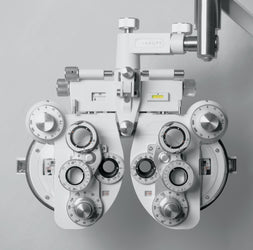How Nutrition Affects Eye Health
The eyes are complex organs that require a range of nutrients to function optimally. Deficiencies in certain vitamins and minerals can lead to eye problems, while a nutrient-rich diet can help protect against conditions such as cataracts, macular degeneration, and dry eye syndrome.

Key nutrients that play a crucial role in maintaining eye health include:
-
Vitamin A: Essential for maintaining the health of the retina and improving night vision. A deficiency can lead to dryness and even more severe eye conditions.
-
Lutein and Zeaxanthin: These antioxidants, found in the retina, help filter harmful blue light and reduce the risk of macular degeneration.
-
Omega-3 Fatty Acids: Found in high concentrations in the retina, omega-3s are essential for maintaining proper eye moisture and reducing the risk of dry eye syndrome.
-
Vitamin C and Vitamin E: Powerful antioxidants that help protect the eyes from oxidative stress and reduce the risk of cataracts and macular degeneration.
-
Zinc: A mineral that supports the transport of vitamin A from the liver to the retina, aiding in the production of protective eye pigments.

Foods to Eat for Better Vision
Incorporating the right foods into your diet can make a noticeable difference in your eye health. Here are some top recommendations:
-
Leafy Greens: Spinach, kale, and Swiss chard are packed with lutein and zeaxanthin, as well as vitamin C.
-
Carrots: Famous for their eye health benefits, carrots are rich in beta-carotene, a precursor of vitamin A.
-
Fatty Fish: Salmon, mackerel, and sardines are excellent sources of omega-3 fatty acids.
-
Eggs: The yolk contains lutein, zeaxanthin, zinc, and vitamin A—a potent combination for eye health.
-
Citrus Fruits: Oranges, grapefruits, and lemons are high in vitamin C, which helps maintain healthy blood vessels in the eyes.
-
Nuts and Seeds: Almonds, sunflower seeds, and walnuts are rich in vitamin E and healthy fats.
-
Whole Grains: Brown rice, quinoa, and whole-wheat bread have a low glycaemic index, which may reduce the risk of age-related macular degeneration.
-
Bell Peppers: These vibrant vegetables are high in vitamin C and beta-carotene, making them a great choice for overall eye health.

Tips for Maintaining Eye Health Through Diet
-
Stay Hydrated: Drinking enough water helps prevent dry eyes.
-
Limit Processed Foods: Diets high in sugar and unhealthy fats can contribute to inflammation and eye-related problems.
-
Eat a Rainbow: A colourful variety of fruits and vegetables ensures you’re getting a wide range of nutrients.
-
Consider Supplements: If your diet lacks certain nutrients, consult with a healthcare provider about supplements like omega-3 or lutein and zeaxanthin.
The Bottom Line
Your diet has a profound impact on your eye health. By incorporating nutrient-rich foods into your meals and making mindful choices, you can protect your vision and enjoy better eye health for years to come. Remember, healthy eyes lead to a clearer view of the world, so nourish them with care!
Take Action: Book an Eye Test Today
Eye health starts with a test. Regular eye exams are essential for catching potential issues early and ensuring your vision stays sharp. Schedule your eye test today and take the first step towards healthier vision.








